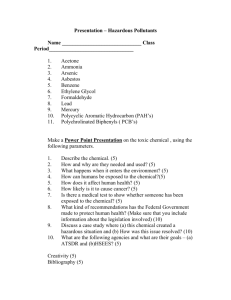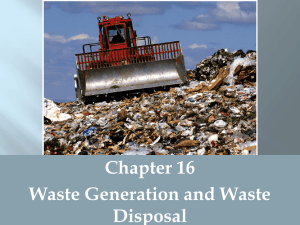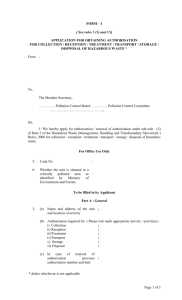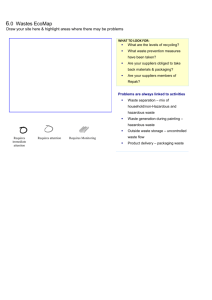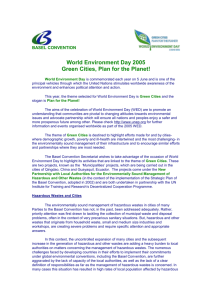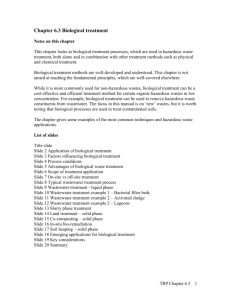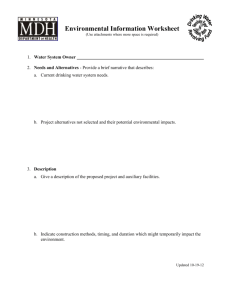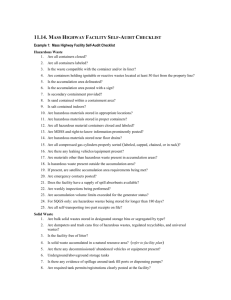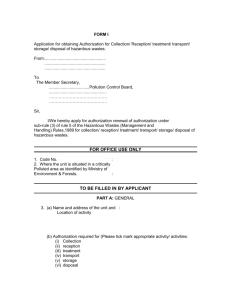Terminal Report - Basel Convention
advertisement
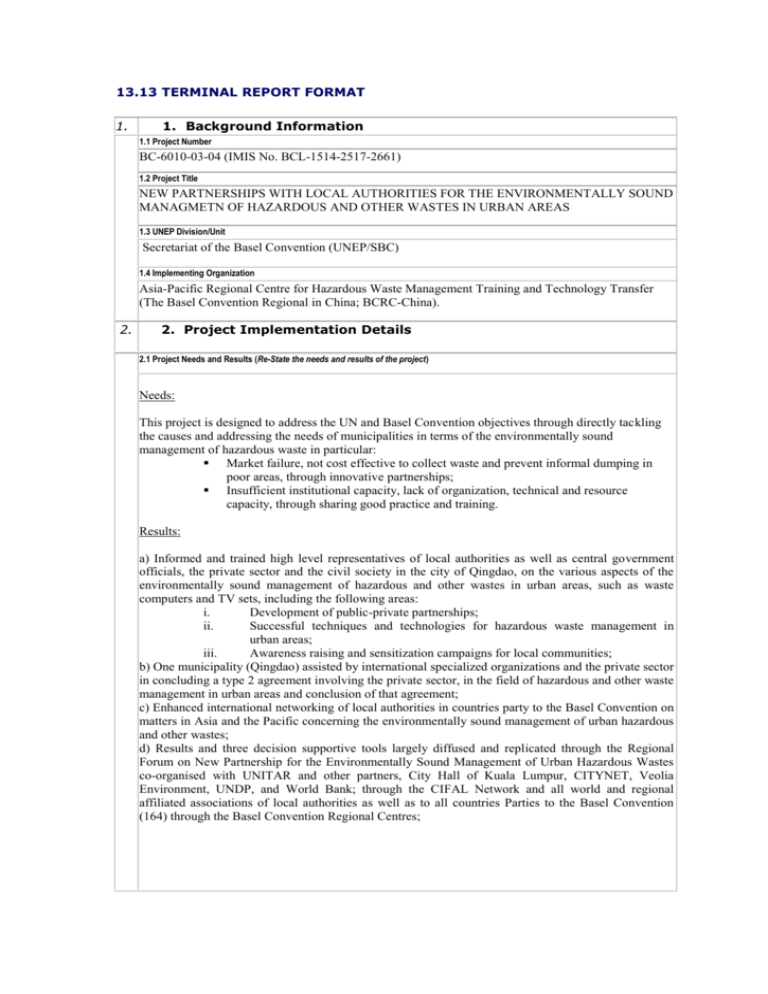
13.13 TERMINAL REPORT FORMAT 1. 1. Background Information 1.1 Project Number BC-6010-03-04 (IMIS No. BCL-1514-2517-2661) 1.2 Project Title NEW PARTNERSHIPS WITH LOCAL AUTHORITIES FOR THE ENVIRONMENTALLY SOUND MANAGMETN OF HAZARDOUS AND OTHER WASTES IN URBAN AREAS 1.3 UNEP Division/Unit Secretariat of the Basel Convention (UNEP/SBC) 1.4 Implementing Organization Asia-Pacific Regional Centre for Hazardous Waste Management Training and Technology Transfer (The Basel Convention Regional in China; BCRC-China). 2. 2. Project Implementation Details 2.1 Project Needs and Results (Re-State the needs and results of the project) Needs: This project is designed to address the UN and Basel Convention objectives through directly tackling the causes and addressing the needs of municipalities in terms of the environmentally sound management of hazardous waste in particular: Market failure, not cost effective to collect waste and prevent informal dumping in poor areas, through innovative partnerships; Insufficient institutional capacity, lack of organization, technical and resource capacity, through sharing good practice and training. Results: a) Informed and trained high level representatives of local authorities as well as central government officials, the private sector and the civil society in the city of Qingdao, on the various aspects of the environmentally sound management of hazardous and other wastes in urban areas, such as waste computers and TV sets, including the following areas: i. Development of public-private partnerships; ii. Successful techniques and technologies for hazardous waste management in urban areas; iii. Awareness raising and sensitization campaigns for local communities; b) One municipality (Qingdao) assisted by international specialized organizations and the private sector in concluding a type 2 agreement involving the private sector, in the field of hazardous and other waste management in urban areas and conclusion of that agreement; c) Enhanced international networking of local authorities in countries party to the Basel Convention on matters in Asia and the Pacific concerning the environmentally sound management of urban hazardous and other wastes; d) Results and three decision supportive tools largely diffused and replicated through the Regional Forum on New Partnership for the Environmentally Sound Management of Urban Hazardous Wastes co-organised with UNITAR and other partners, City Hall of Kuala Lumpur, CITYNET, Veolia Environment, UNDP, and World Bank; through the CIFAL Network and all world and regional affiliated associations of local authorities as well as to all countries Parties to the Basel Convention (164) through the Basel Convention Regional Centres; 2.2 Project Activities (Describe the activities actually undertaken under the project, giving reasons why some activities were not undertaken, if any) 2.1. Preparation of three decision supportive tools for the environmentally sound management of hazardous and other wastes in urban areas in Asia Three decision supportive tools were prepared for the environmentally sound management of hazardous and other wastes in the urban areas of Asia; these tools were derived from reviews of successful stories in various Asian cities (See Appendix 1: Development of the Decision Supportive Tools for Hazardous Waste Management). Tool 1: Development of public-private partnership Tool 2: Successful technologies and techniques Tool 3: Awareness raising and sensitization campaigns The three decision supportive tools prepared by this project mainly introduce the successful stories of hazardous waste management in Japan, because Japan is the only developed country using an environmentally sound management of waste in Asia and the Pacific region. More specifically, the three decision supportive tools involve the successful stories of Eco-Town Enterprise, implemented by the city of Kitakyushu, which is a project partner with the BCRC China. Therefore, although it was expected to involve several instances of the environmentally sound management, for hazardous waste management, from various cities in Asia, only one instance/scenario of hazardous waste management on the environmentally sound management was studied and used for the development of the tools. The reason is that most Asian countries and cities do not have any detailed material to describe their instances of hazardous waste management even if it is in an environmentally sound manner. Another reason is that some countries served by BCRC China are only now, currently, trying to introduce the concepts of the environmentally sound management, and this means that these countries have not yet established a hazardous waste management on the environmentally sound management. 2.2. Demonstration project and development of a bilateral collaboration programme Activity 2 described in the proposal document, namely Type II Partnership Agreement on hazardous waste and E-waste, has been implemented by organising Type II Initiative Meetings held in Qingdao, 12 August 2004 (See Appendix 2: Report of the Initiative of Public-Private Partnership for Hazardous Wastes on Environmentally Sound Management in Qingdao; Appendix 3: Report of the Initiative of the Environmentally Sound Management for E-waste in Qingdao). Main stakeholders addressing hazardous waste management and E-waste management in Qingdao have agreed and signed on each type II agreement. Activity 1 (the development of an appropriate management system), 3 (a notification system) and 4 (a collection system) described in the proposal document, has been developed for hazardous wastes by Qingdao solid waste management center, the local partner in this project, and with the technical assistance of BCRC China; however, with the support of Qingdao Solid Waste Management Center, Qingdao Reform and Development Committee, which is the municipal body of the administration in Qingdao, is currently preparing an appropriate collection system and notification system within the legal framework of each Chinese national law for E-waste which has just been issued. Some legal documents have been drafted, such as Management Measure on Collection and Treatment of Waste Electric and Electronic Equipment for Pilot Project in Qingdao and Work Plan on Collection and Treatment of Waste Electric and Electronic Equipment for Pilot Project in Qingdao. As stated, a certain Japanese recycling company has a plan to set up a recycling facility for E-waste in Qingdao and has already visited Qingdao Environmental Protection Bureau to discuss. Although this is just the planning stage, this approach will support Qingdao City to introduce and implement the environmentally sound management for E-waste. During the implementation stage, the preparatory work of a facility, which includes hazardous waste treatment and e-waste recycling, was finished and some processes have now been in operation. 2.3. A national forum on new partnership for the environmentally sound management of urban hazardous wastes such as hazardous industrial and electronic wastes The National Forum on New Partnership for the Environmentally Sound Management of Urban Hazardous Wastes was held in Qingdao, 10-11 August 2004, co-organised by BCRC China and Qingdao Environmental Protection Bureau (See Appendix 4: Report of the National Forum on New Partnership for the Environmentally Sound Management of Urban Hazardous Wastes). This forum focused on summarizing the process of hazardous waste management in a pilot city and issues existed in the process of project implementation, sharing with the successful experience of hazardous waste management in other cities as well as how to apply them from other cities to the hazardous waste management of a pilot city and discussing how to effectively distribute the respective responsibility taken by all stakeholders in Qingdao so as to promote the project implementation. 2.4. A regional forum on new partnership for the environmentally sound management of urban hazardous wastes such as hazardous industrial and electronic wastes The Regional Forum on New Partnership for the Environmentally Sound Management of Urban Hazardous Wastes was held as Kuala Lumpur Regional Training Centre (KLRTC) Training Course 4: Sustainable Solid Waste Management in Asia-Pacific Cities, coorganised with a partnership with City Hall of Kuala Lumpur, CITYNET (The Regional Network of Local Authorities for the Management of Human Settlements), United Nations Institute for Training and Research (UNITAR), Veolia Environnement, United Nations Development Programme (UNDP) and World Bank, in Kuala Lumpur, Malaysia, 12-19 December 2004 (See Appendix 5: Proceedings of Regional Forum on New Partnership for the Environmentally Sound Management of Urban Hazardous Wastes). The regional forum focused on the integrated waste management at a municipal level. 41 participants attended the regional forum from 15 countries: Bangladesh, Cambodia, Federated States of Micronesia, Fiji, India, Indonesia, Iran, Republic of Korea, Malaysia, Nepal, P.R.China, Philippines, Sri Lanka, Thailand and Vietnam. The resource persons were from City Hall of Kuala Lumpur, Universiti Putra Malaysia, UNITAR, IGES (Institute for Global Environmental Strategies) and JICA (Japan International Cooperation Agency) as well as SBC, BCRC China and Qingdao municipality. The regional forum was composed of the presentations of the resource persons and participants, working groups, video conference and technical tours. 2.5. Shooting of a video film This activity has not been implemented due to the fact that SBC and BCRC China could not find a donor and additional budget for it. 2.6. Survey of the Import and the Environmentally Sound Management of Electronic Wastes in the Asia-Pacific Region The participating countries for surveying E-waste information were Cambodia, China, Malaysia, Sri Lanka and Thailand. BCRC China had employed a national consultant in each participating country, and the national consultants had surveyed E-waste information with the focal points of the Basel Convention in each country. Of these countries, China, Sri Lanka and Thailand decided to organise a national E-waste workshop and as of now, have organised the national E-waste workshop. All countries have finalized and submitted the final report. The project final report covers the comprehensive E-waste management situation in the participating countries and indicates the needs of each participating countries in order to under take the environmentally sound management for E-waste (See Appendix 6: Report on the Survey of the Import and the Environmentally Sound Management of Electronic Wastes in the Asia Pacific Region). 2.3 Project Outputs (Compare the outputs generated with the ones listed in the project document) Networking 1. Operation of the website of BCRC China. Participation in meetings 2. International Conference on Electronic Waste and Producers' Environmental Responsibilities in China, Beijing, P.R.China, organised by Greenpeace and Chinese Society for Environmental Sciences, 21-22 April 2004; 3. Regional Awareness-Raising Workshop on Mercury Pollution – A global problem that needs to be addressed, organised by UNEP Chemicals and the Ministry of Natural Resources and the Environment of the Kingdom of Thailand. Bangkok, 26-29 April 2004; 4. Expert Group Meeting on E-waste in the Asia-Pacific, organised by UNEP Regional Resource Centre, Bangkok, Thailand, 22-23 June 2004; 5. Third Meeting of the Kitakyushu Initiative Network, organised by UNESCAP, the Ministry of Foreign Affairs of Japan, the Ministry of Environment of Japan, Institute for Global Environmental Strategies and the City of Kitakyushu, Fukuoka, Japan 2-4 August 2004; 6. Second Workshop on Prevention of Illegal Transboundary Movement of Wastes, organised by Japanese Ministry of the Environment, Tokyo, Japan, 7-8 December 2004; 7. Ministerial Conference on the 3R Initiative, organised by Japanese Ministry of the Environment, Tokyo, Japan, 28-30 April 2005; 8. Asia-Pacific Regional Inception Workshop on the Environmentally Sound Management of Electronic and Electrical Wastes, organised by Secretariat of the Basel Convention, Japanese Ministry of the Environment, National Institute for Environmental Studies in Japan, Tokyo, Japan, 21-22 and 24-25 November 2005; 9. Third Workshop on Prevention of Illegal Transboundary Movement of Wastes, organised by Japanese Ministry of the Environment, Tokyo, Japan, 23 November 2005; 10. The Second NIES (National Institute for Environmental Studies) Workshop on E-waste, organised by National Institute for Environmental Studies, Tokyo, Japan, 23 November 2005. Organising meetings 1. China-Japan Seminar for Recycling Oriented-Society, organised by (co-organizer: BCRC China) The Sino- Japan Friendship Centre for Environmental Protection, Qingdao City, City of Kitakyushu and Kitakyushu International Techno-Cooperative Association (KITA), Qingdao, P.R.China, 15 January 2004; 2. China-Netherlands Seminar on Recycling for Electronics, organised by BCRC China and Tsinghua University, Delft University and BCRC China, Beijing, P.R.China, 16-17 November 2004; 3. The International Conference on Management, Policy, Treatment and Disposal Technology of Hazardous Wastes in 2005, BCRC China, Tsinghua University, Chinese Research Academy of Environmental Protection, Sino-Japan Friendship Centre for Environmental Protection, Cleanaway Group, Beijing, P.R.China, 31 May-1 June 2005. 2.4 Use of Outputs (State the use made of the outputs) 2.5 Degree of achievement of the objectives/results (On the basis of facts obtained during the follow-up phase, describe how the project document outputs and their use were or were not instrumental in realizing the objectives / results of the project) Operations – objectives achieved 100%; Activities – results achieved 100%. 2.6 Determine the degree to which project contributes to the advancement of women in Environmental Management and describe gender sensitive activities carried out by the project. The gender issues were observed while implementing the project. No discrimination has been observed from the project management. No specific or gender sensitive activities were conducted by the project. 2.7 Describe how the project has assisted the partner in sustained activities after project completion. The project not only trained local authorities but also enhanced international networks between various local and international affiliations. Results, three decision supportive tools, produced reports and guidelines obtained through the project are now used as intellectual tools for the development of future projects and better strategies. 3 3. Conclusions Environmentally Sound Management of hazardous waste should be addressed cooperatively with public-private partnerships, which seems to be a new concept for the hazardous waste management regime, especially for the municipalities. Some countries in Asia and the Pacific region have not established hazardous waste management mechanism yet and are only in the stage of preparing it for future full implementation. Therefore, it is highly recommended that one introduce the concept of environmentally sound management now, so as to ensure that all practical steps to ensure hazardous wastes or other wastes are managed in a manner that will protect human health and the environment. In addition, public-private partnerships should be developed for the environmentally sound management of not only hazardous waste but also municipal solid waste. These two pillars are the most important points for an environmentally sustainable development in Asia and the Pacific region. 3.2 Recommendations (Make recommendations to (a) Improve the effect and impact of similar projects in the future and (b) Indicate what further action might be needed to meet the project objectives / results) Although the development of Type II Initiative was only in Qingdao, China, which was the demonstration city for the project, the outcome of how the BCRC China developed the initiative has been effectively disseminated throughout Asia and the Pacific Region with the use of a regional forum. However, in order to encourage a public-private partnership (Type II Initiative) of the environmentally sound management for hazardous wastes and other wastes, it is important to continuously support the focal points/competent authorities to the Basel Convention on cooperation among all stakeholders at regional/national/local levels. For future activities, the Secretariat of the Basel Convention, The Basel Convention Regional Centres and other intergovernmental organisations in the region have to undertake further activities on the environmentally sound management for hazardous wastes and other wastes, especially with local organizations. 4. 4. Attachments 4.1 Attach an inventory of all non-expendable equipment (value over US$ 1,500) purchased under this project indicating Date of Purchase, Description, Serial Number, Quantity, Cost, Location and Present Condition, together with your proposal for the disposal of the said equipment None 4.2 Attach a final Inventory of all Outputs/Services produced through this project List of Output Documentation: Development of the Decision Supportive Tools for Hazardous Waste Management (English Version). Development of the Decision Supportive Tools for Hazardous Waste Management (Chinese Version). The Initiative of Public-Private Partnership for Hazardous Wastes on Environmentally Sound Management in Qingdao. Proceedings of the National Forum on “New Partnership with Local Authorities for the Environmentally Sound Management of Hazardous and Other Wastes in Urban Areas”. Regional Forum on New Partnership for the Environmentally Sound Management of Urban Hazardous Wastes. Available at SBC’s web site under the section for China: http://www.basel.int/centers/projects.html

